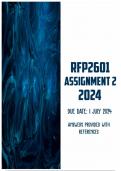, PLEASE USE THIS DOCUMENT AS A GUIDE TO ANSWER YOUR ASSIGNMENT
Please note that the author of this document will not responsibility for any plagiarizing you
commit.
Question 1
1.1. Explain why reading is so important in the foundation phase.
Reading is crucial in the foundation phase of schooling as it lays the groundwork for all future
learning and literacy development. It is essential for cognitive development, enabling children to
process and understand information effectively. Reading skills also contribute significantly to
language acquisition, vocabulary expansion, and comprehension abilities. Moreover, early reading
experiences foster a love for reading and learning, which is vital for academic success. Engaging
with texts enhances critical thinking and imagination, promoting problem-solving skills. Furthermore,
reading proficiency is linked to overall academic achievement, making it a fundamental component
of a child's educational journey.
[OR]
Reading is crucial in the foundation phase for several reasons. Firstly, it is a fundamental life skill
that forms the building blocks of communication and understanding. Without the ability to read,
individuals would struggle to function adequately in society, make sense of the world around them,
and access correct information from labels, signs, emails, memorandums, and letters. Additionally,
reading is essential for research, contributing to knowledge, and securing a good job. In the context
of education, reading is vital for learning and development, as it is the gateway to accessing
information across various subjects and assignments. Therefore, in the foundation phase, reading
plays a pivotal role in laying the groundwork for children's future learning and overall cognitive
development.
(Study Guide - Page 2-4)
1.2. Rule and Land (2017:2) state that “most South African children do not learn to read well.”
Justify the reason for their statement.
Rule and Land (2017:2) state that “most South African children do not learn to read well” for several
compelling reasons. One primary factor is the focus on reading fluency and pronunciation at the
expense of comprehension. Teachers often emphasize reading aloud correctly rather than ensuring
that students understand the content of what they read. This approach leads to students who can read
words but struggle to derive meaning from texts.
Additionally, socioeconomic factors significantly impact reading skills. Many South African schools
serve low-income communities where resources are scarce, and parents may lack the literacy skills to
support their children's reading development at home. The absence of school libraries and inadequate
training for teachers in reading pedagogy further exacerbate the problem. The medium of instruction
often being different from the learner's home language also hampers effective reading development,
as students struggle to learn in a language they are not fluent in.
(Study Guide - Page 6)




